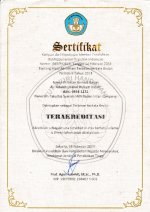Zhihar Contextualization in Indonesia: an Anthropo-Linguistic Study
Abstract
The law of zhihar (equating wife to her mother) is closely related to Arabic culture, where the Qur'an was revealed. In Indonesia, zhihar law cannot be enforced because of social norms differences. This article examines the contextualization of zhihar in Indonesia. The aim is to examine the meaning of zhihar in the Qur’an which is then applied in the context of Indonesian culture. Specifically, the contextualization includes the use of language in the zhihar which is then linked to the existing cultural context. This research is purely a literature study using qualitative methods. The approach used is the sociology of language, or more specifically it can be called the anthropo-linguistic approach. The results of the study show that respect is deeply embedded in family life in Indonesia. This means that the husband may equate his wife with his mother-in-law; But not forbid himself against his wife, only to praise and respect her. From the perspective of the sociology of language, this compliment is a reflection of cultural values that have long lived in Indonesian society. The mufassirs (the commentators of al-Qur'an) stated that this action is not zhihar because the lafadz zhihar requires the intention to forbid husband and wife relations. Therefore, it is necessary to conduct an in-depth study dealing with the axiological value of the law of zhihar in the Qur'an which is linked to socio-cultural aspects.
Keywords
Full Text:
PDFReferences
Ahimsa, Heddy Shri Purta. Strukturalisme Levi Strauss: Mitos Dan Karya Sastra. Yogyakarta: Galang Press, 2015.
Al-Barudi, Syaikh Imad Zaki. Tafsir Wanita. Translated by Samson Rahman. Jakarta: Pustaka Al-Kautsar, 2013.
Andayani, Budi. “Pentingnya Budaya Menghargai Dalam Keluarga.” Buletin Psikologi X, no. 1 (June 2012).
Dadang Jaya. “Zhihar Sebagai Perbuatan Pidana (Sebuah Kajian Pustaka).” Jurnal At-Tadbir: Media Hukum Dan Pendidikan 30, no. 1 (2020).
Dora, Sonia. “Zhihar Perspektif Mufassir Indonesia.” Skripsi, Universitas Islam Negeri Walisongo, 2014.
EM, Abdul Ghofar. Fikih Keluarga. Jakarta: Pustaka Al-Kautsar, 2011.
Fikar, Nukhbatul. “Konsep Zhihar Dan Penerapannya Dalam Keluarga Islam Nusantara.” Tesis, Universitas Islam Negeri Sultan Maulana Hasanuddin, 2018.
Indomo, Abdul Malik Karim Amrullah Datuk. Tafsir Al-Azhar. Jakarta: Pustaka Panjimas, 1992.
Kemenag RI. Al-Qur’an Dan Tafsirnya Jilid X. Jakarta: PT. Sinergi Pustaka Indonesia, 2017.
Magdalena, R. “Kedudukan Perempuan Dalam Perjalanan Sejarah (Studi Tentang Kedudukan Perempuan Dalam Masyarakat Islam).” Harkat An-Nisa: Jurnal Studi Gender Dan Anak 11, no. 1 (2017).
Mahpi, Gio. “Kontekstualisasi Ẓihār Dalam Al-Qur’an (Studi Komparatif Kitab Tafsir Tafsir Ahkamul Qur’an Al-Jassaṣ & Rawai’ul Bayan As-Sabuni).” Skripsi, Universitas Islam Negeri Sultan Maulana Hasanuddin, 2021.
Mawla, M. Ahmad Jadul. Kisah-Kisah Al-Qur’an. Translated by Abdurahman Assegaf. Jakarta: Zaman, 2009.
Mubasirun and Sa’adi. “The Dynamics Of Spirituality In The Old Age: The Perspective Of Maqashid Al-Shariah And Psychology.” AKADEMIKA: Jurnal Pemikiran Islam 26, no. 01 (June 2021).
Munandar, Arif, and Muslim Djuned. “Zihar Dalam Tafsir Fi Zhilal Al-Qur’an Dan Tafsir Al-Mishbah.” Tafse: Journal of Qur’ Anic Studies 3, no. 1 (2018).
Muzammil, Iffah. Fiqh Munakahat. Tangerang: Tira Smart, 2019.
Ningrum, Anis Widiya. “Ẓihar Dalam Al-Quran Dan Kontekstualisasinya Pada Persoalan Komunikasi Suami Istri.” Skripsi, Universitas Islam Negeri Sunan Ampel, 2018.
Nurdin, Zurifah. “Zihar Dan Ila’ Dalam Kajian Sosiologis, Filosofis, Normatif, Yuridis, Psikologis, Dan Ekonomis.” Institut Agama Islam Negeri Bengkulu, 2014.
Nurjanah, Siti, and Iffatin Nur. “Gender Fiqh: The Mobilization Of Genderresponsive Movements On Social Media.” Ijtihad: Jurnal Wacana Hukum Islam Dan Kemanusiaan 22, no. 1 (2022).
Nuryani, Siti Isnaniah, and Ixsir Eliya. Sosiolinguistik Dalam Pengajaran Bahasa Berbasis Multikultural: Teori Dan Praktik Penelitian. Bogor: Penerbit IN MEDIA, 2021.
Rahman, Abdur. Perkawinan Dalam Syariat Islam. Jakarta: Rineka Cipta, 2015.
Rohidin. Pengantar Hukum Islam: Dari Semenanjung Arabia Hingga Indonesia. Yogyakarta: Lintang Publising, 2016.
Rohim, Miftahur. “Analisis Kontrastif Bahasa Indonesia Dan Bahasa Arab Berdasarkan Kala, Jumlah, Dan Persona.” Skripsi, Universitas Negeri Semarang, 2013.
Suriansyah, Eka. “Rekonstruksi Konsep Zhihar (Perspektif Mazhab Sunni).” Tesis, Universitas Islam Negeri Sunan Kalijaga, 2010.
Syamsuddin, Ali. Bahan Ajar Matakuliah Sistem Sosial Budaya Indonesia Jurusan Ilmu Komunikasi. Bandung: Universitas Komputer Indonesia, 2010.
Wargadinata, Wildana. “Tradisi Arab Di Masa Nabi (Dalam Perspektif Teori Change and Continuity).” Jurnal El-Harakah 5, no. 2 (Oktober 2003).
DOI: http://dx.doi.org/10.24042/adalah.v19i2.14040
Refbacks
- There are currently no refbacks.
Copyright (c) 2023 Al-'Adalah
Al-'Adalah is licensed under a Creative Commons Attribution-ShareAlike 4.0 International License.



.png)
_(1).png)
_(1).png)

.png)
